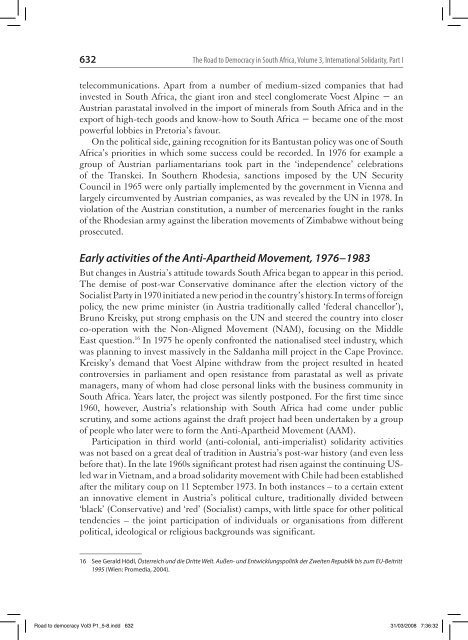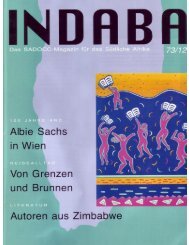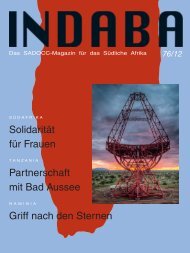Austria and South Africa during apartheid The set-up of ... - SADOCC
Austria and South Africa during apartheid The set-up of ... - SADOCC
Austria and South Africa during apartheid The set-up of ... - SADOCC
Create successful ePaper yourself
Turn your PDF publications into a flip-book with our unique Google optimized e-Paper software.
632 <strong>The</strong> Road to Democracy in <strong>South</strong> <strong>Africa</strong>, Volume 3, International Solidarity, Part I<br />
telecommunications. Apart from a number <strong>of</strong> medium-sized companies that had<br />
invested in <strong>South</strong> <strong>Africa</strong>, the giant iron <strong>and</strong> steel conglomerate Voest Alpine − an<br />
<strong>Austria</strong>n parastatal involved in the import <strong>of</strong> minerals from <strong>South</strong> <strong>Africa</strong> <strong>and</strong> in the<br />
export <strong>of</strong> high-tech goods <strong>and</strong> know-how to <strong>South</strong> <strong>Africa</strong> − became one <strong>of</strong> the most<br />
powerful lobbies in Pretoria’s favour.<br />
On the political side, gaining recognition for its Bantustan policy was one <strong>of</strong> <strong>South</strong><br />
<strong>Africa</strong>’s priorities in which some success could be recorded. In 1976 for example a<br />
gro<strong>up</strong> <strong>of</strong> <strong>Austria</strong>n parliamentarians took part in the ‘independence’ celebrations<br />
<strong>of</strong> the Transkei. In <strong>South</strong>ern Rhodesia, sanctions imposed by the UN Security<br />
Council in 1965 were only partially implemented by the government in Vienna <strong>and</strong><br />
largely circumvented by <strong>Austria</strong>n companies, as was revealed by the UN in 1978. In<br />
violation <strong>of</strong> the <strong>Austria</strong>n constitution, a number <strong>of</strong> mercenaries fought in the ranks<br />
<strong>of</strong> the Rhodesian army against the liberation movements <strong>of</strong> Zimbabwe without being<br />
prosecuted.<br />
Early activities <strong>of</strong> the Anti-Apartheid Movement, 1976−1983<br />
But changes in <strong>Austria</strong>’s attitude towards <strong>South</strong> <strong>Africa</strong> began to appear in this period.<br />
<strong>The</strong> demise <strong>of</strong> post-war Conservative dominance after the election victory <strong>of</strong> the<br />
Socialist Party in 1970 initiated a new period in the country’s history. In terms <strong>of</strong> foreign<br />
policy, the new prime minister (in <strong>Austria</strong> traditionally called ‘federal chancellor’),<br />
Bruno Kreisky, put strong emphasis on the UN <strong>and</strong> steered the country into closer<br />
co-operation with the Non-Aligned Movement (NAM), focusing on the Middle<br />
East question. 16 In 1975 he openly confronted the nationalised steel industry, which<br />
was planning to invest massively in the Saldanha mill project in the Cape Province.<br />
Kreisky’s dem<strong>and</strong> that Voest Alpine withdraw from the project resulted in heated<br />
controversies in parliament <strong>and</strong> open resistance from parastatal as well as private<br />
managers, many <strong>of</strong> whom had close personal links with the business community in<br />
<strong>South</strong> <strong>Africa</strong>. Years later, the project was silently postponed. For the first time since<br />
1960, however, <strong>Austria</strong>’s relationship with <strong>South</strong> <strong>Africa</strong> had come under public<br />
scrutiny, <strong>and</strong> some actions against the draft project had been undertaken by a gro<strong>up</strong><br />
<strong>of</strong> people who later were to form the Anti-Apartheid Movement (AAM).<br />
Participation in third world (anti-colonial, anti-imperialist) solidarity activities<br />
was not based on a great deal <strong>of</strong> tradition in <strong>Austria</strong>’s post-war history (<strong>and</strong> even less<br />
before that). In the late 1960s significant protest had risen against the continuing USled<br />
war in Vietnam, <strong>and</strong> a broad solidarity movement with Chile had been established<br />
after the military co<strong>up</strong> on 11 September 1973. In both instances – to a certain extent<br />
an innovative element in <strong>Austria</strong>’s political culture, traditionally divided between<br />
‘black’ (Conservative) <strong>and</strong> ‘red’ (Socialist) camps, with little space for other political<br />
tendencies – the joint participation <strong>of</strong> individuals or organisations from different<br />
political, ideological or religious backgrounds was significant.<br />
16 See Gerald Hödl, Österreich und die Dritte Welt. Außen- und Entwicklungspolitik der Zweiten Republik bis zum EU-Beitritt<br />
1995 (Wien: Promedia, 2004).<br />
Road to democracy Vol3 P1_5-8.indd 632 31/03/2008 7:36:32





